Limited Availability: Treatment beds filling quickly. Call now for immediate placement – (844) 561-0606
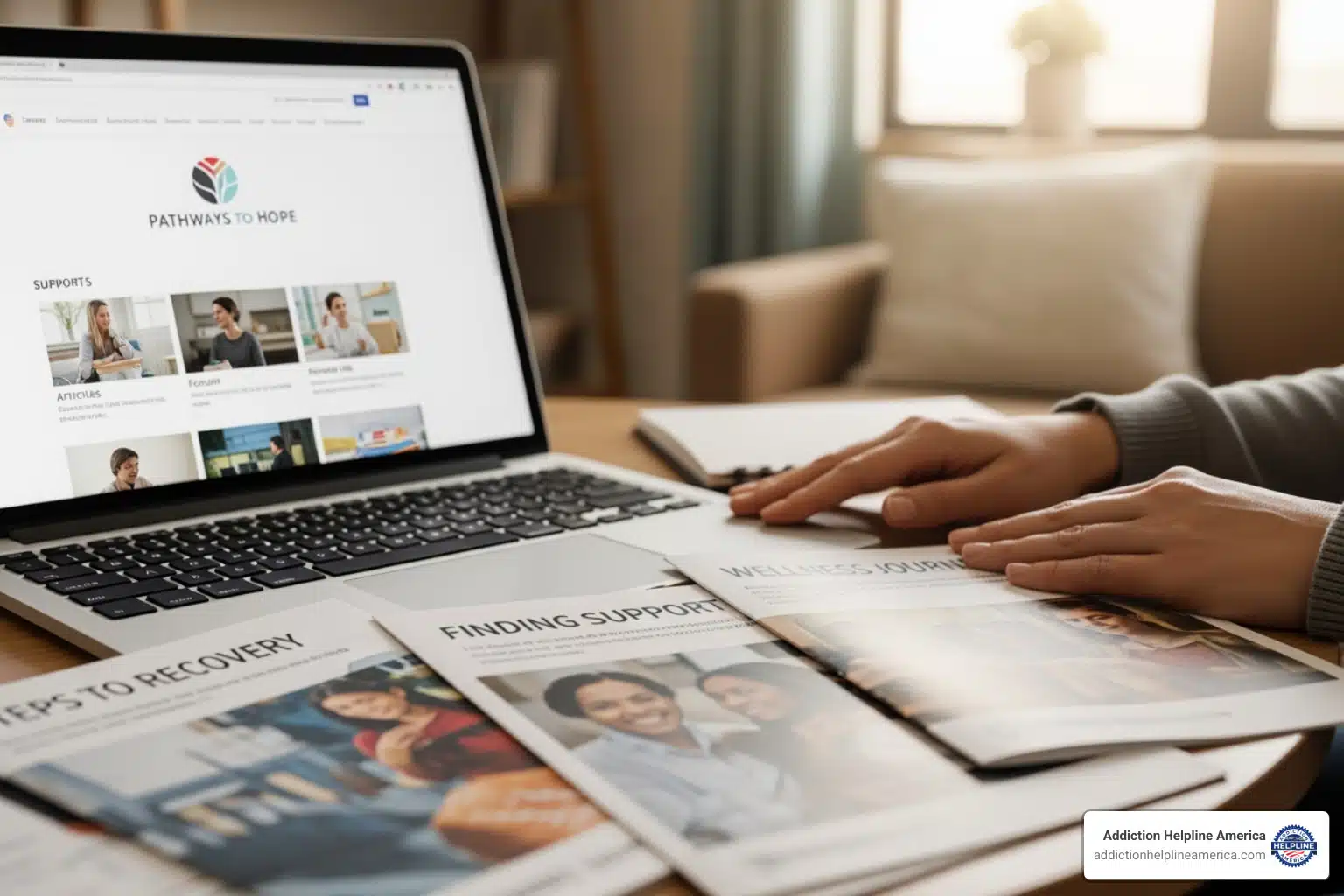
Navigating Helpful Links and Resources for drug rehab and aa/ na meetings and al anon can feel overwhelming when you’re in crisis. Whether you’re struggling with addiction or watching a loved one suffer, knowing where to turn for immediate, trustworthy help is critical.
Quick Access to Essential Recovery Resources:
| Resource Type | Primary Options | What You’ll Find |
|---|---|---|
| Federal Treatment Locators | SAMHSA’s FindTreatment.gov, NIDA | Professional rehab centers, medication-assisted treatment, evidence-based information |
| Peer Support Groups | AA, NA, SMART Recovery | Free meetings, sponsorship, 12-step programs, community support |
| Family Support | Al-Anon, Alateen, Nar-Anon | Coping strategies for loved ones, local meetings, setting boundaries |
| Crisis Help | 988 Suicide & Crisis Lifeline, SAMHSA National Helpline | 24/7 confidential support, immediate intervention |
The good news is that help is effective and accessible. More than two million people have found recovery through programs like Alcoholics Anonymous, and research consistently shows that support meetings lead to higher abstinence rates. Modern technology has made these resources more available than ever.
Recovery isn’t one-size-fits-all. Some find hope in 12-step programs like AA or NA, while others connect with professional treatment or alternative groups like SMART Recovery. Family members find their own healing through Al-Anon, learning they’re not alone.
At Addiction Helpline America, we connect individuals and families with resources that match their unique situations. Our team understands that the right support can mean the difference between continued suffering and lasting recovery.
This guide breaks down the seven most trusted websites and resources you need—from federal treatment locators to peer support communities and family resources. Each offers a different path toward healing.
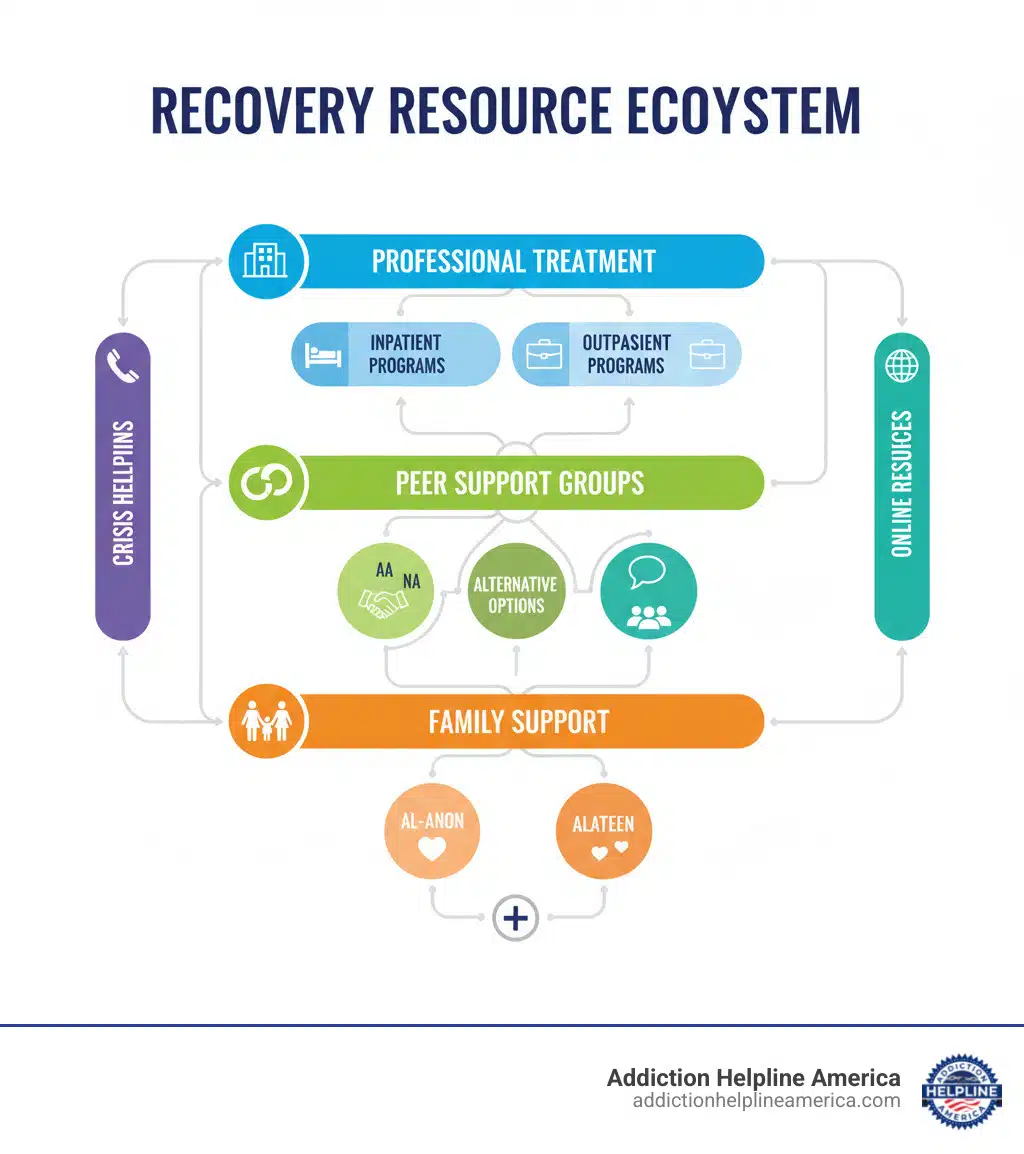
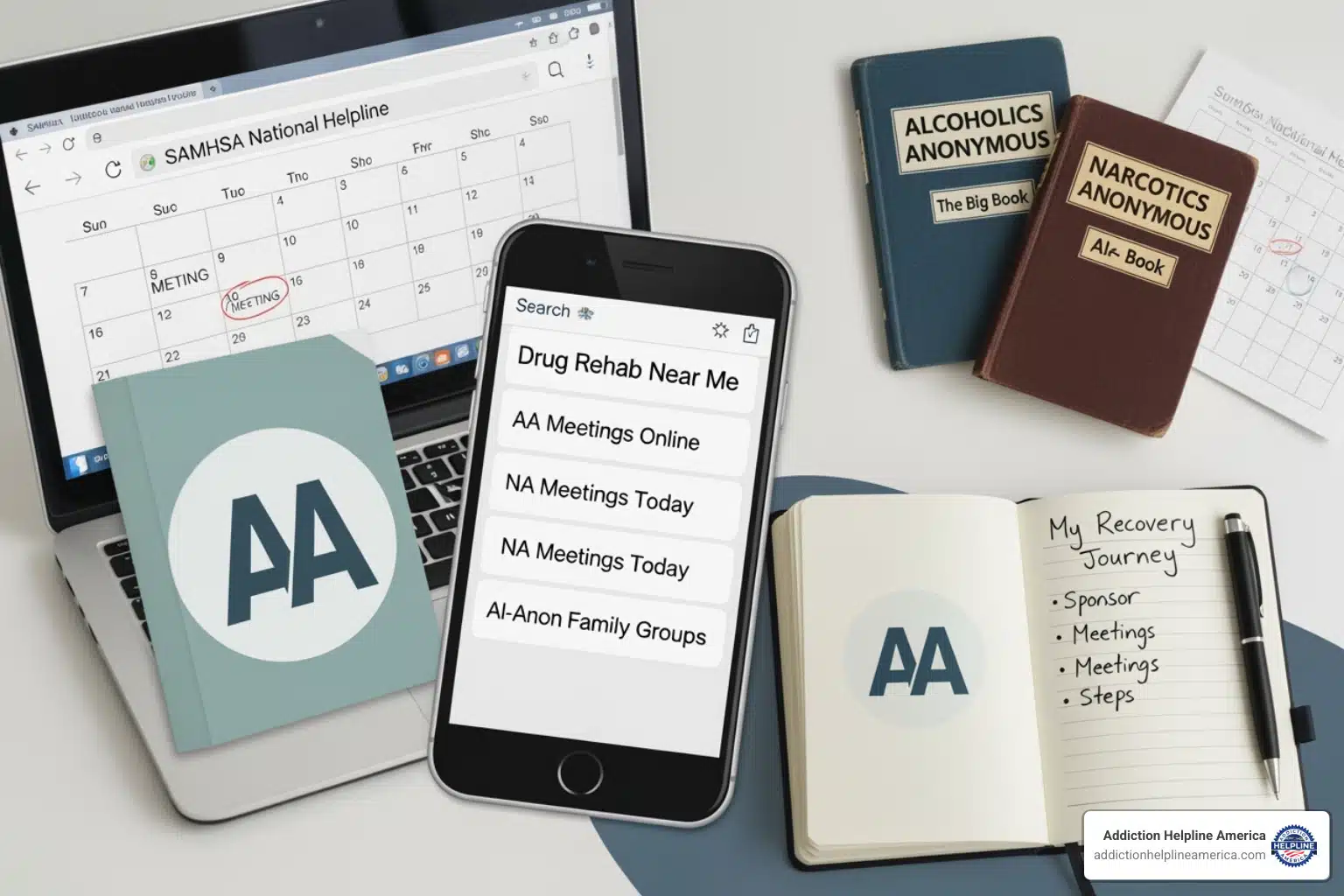
When searching for trustworthy information, two federal agencies are gold-standard resources: the Substance Abuse and Mental Health Services Administration (SAMHSA) and the National Institute on Drug Abuse (NIDA). SAMHSA helps you find treatment, while NIDA explains the science behind addiction. Together, they provide evidence-based Helpful Links and Resources for drug rehab and aa/ na meetings and al anon.
SAMHSA’s primary mission is to reduce the impact of substance abuse and mental illness. Their most powerful tool is FindTreatment.gov, a free, confidential database of treatment facilities across the U.S. Simply enter your location and treatment type to find nearby options with details on services and payment.
For more detail, SAMHSA offers the 2024 National Directory of Drug and Alcohol Use Treatment Facilities, listing thousands of providers. They also have specialized directories, like the Opioid Treatment Program Directory for medication-assisted treatment and a Buprenorphine Practitioner Locator. These are valuable for understanding What is Medication Assisted Treatment.
If you’re wondering How Long is Rehab or about different settings, SAMHSA’s directories clarify options like Inpatient Drug Rehab, outpatient programs, and residential care. You can filter by programs for veterans, LGBTQ+ individuals, or those with co-occurring mental health conditions, helping you make an informed decision.
While SAMHSA connects people to treatment, NIDA helps us understand why it works. As a leader in addiction research, NIDA’s website translates complex neuroscience into plain language. Their resources explain how the Brain is Affected by Drug Addiction, framing it as a brain disease, not a moral failing.
Both agencies offer free digital libraries with treatment guides and family resources, including Information on Substance Use and Information on Mental Health. They provide crucial information on co-occurring disorders, where addiction is treated alongside conditions like depression or anxiety.
Most importantly, SAMHSA operates the 988 Suicide & Crisis Lifeline. If you or a loved one is in crisis, call or text 988 anytime for 24/7 confidential support from trained counselors. These federal resources provide the knowledge to understand addiction and the tools to find help.
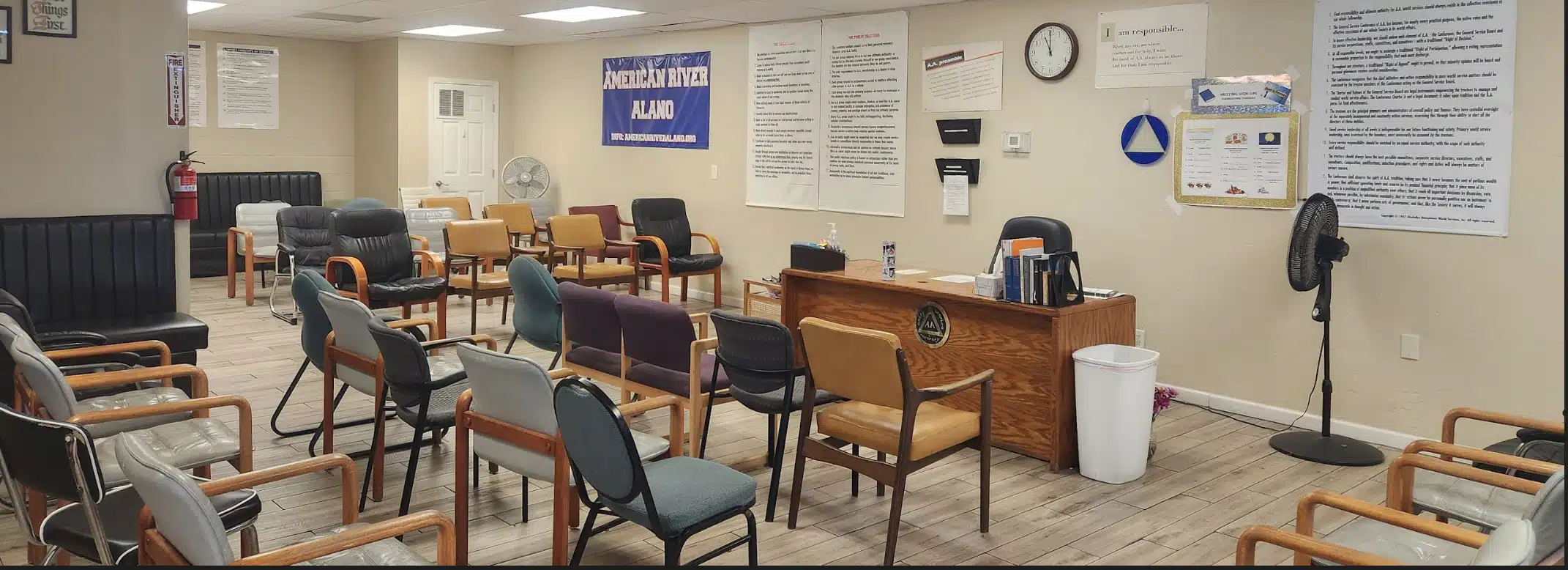
There’s something powerful about connecting with people who truly understand what you’re going through. For millions, peer support groups like Alcoholics Anonymous (AA) and Narcotics Anonymous (NA) have been lifesavers. These are not therapy sessions; they are gatherings of people sharing their experiences, strength, and hope. The shared experience builds connection and a sense of belonging.
Peer support groups are often the most accessible starting point for finding Helpful Links and Resources for drug rehab and aa/ na meetings and al anon. AA has helped millions achieve sobriety, and NA has grown into a massive global recovery organization.
Meetings happen daily in nearly every community, and finding one is easy with online meeting finders. Our Support Groups for Addiction page connects you to these resources, and our Narcotics Anonymous Meetings page offers more specific information. Online meetings are also widely available 24/7 on platforms like In The Rooms. You can attend open meetings, which welcome anyone, or closed meetings, which are for those with a desire to stop using.
A key feature is sponsorship, where a member with solid recovery time guides you through the program. This mentorship relationship is often a cornerstone of lasting recovery.
At the heart of AA and NA are The Twelve Steps, a set of spiritual principles for personal growth. The program is spiritual, not religious, encouraging members to find a “higher power” as they understand it. The steps emphasize personal responsibility, self-examination, making amends, and helping others.
The Big Book of AA and NA’s Basic Text contain the program’s philosophy and personal stories that can be incredibly healing to read. The core message is one of hope: any addict can stop using and find a new way of life. Daily inspiration is available through tools like NA’s “Just for Today” daily meditation emails. You can also find hope by listening to personal stories on Recovery YouTube Resources.
The foundation of these programs is one person helping another. That peer support is powerful, and it’s available to you right now.
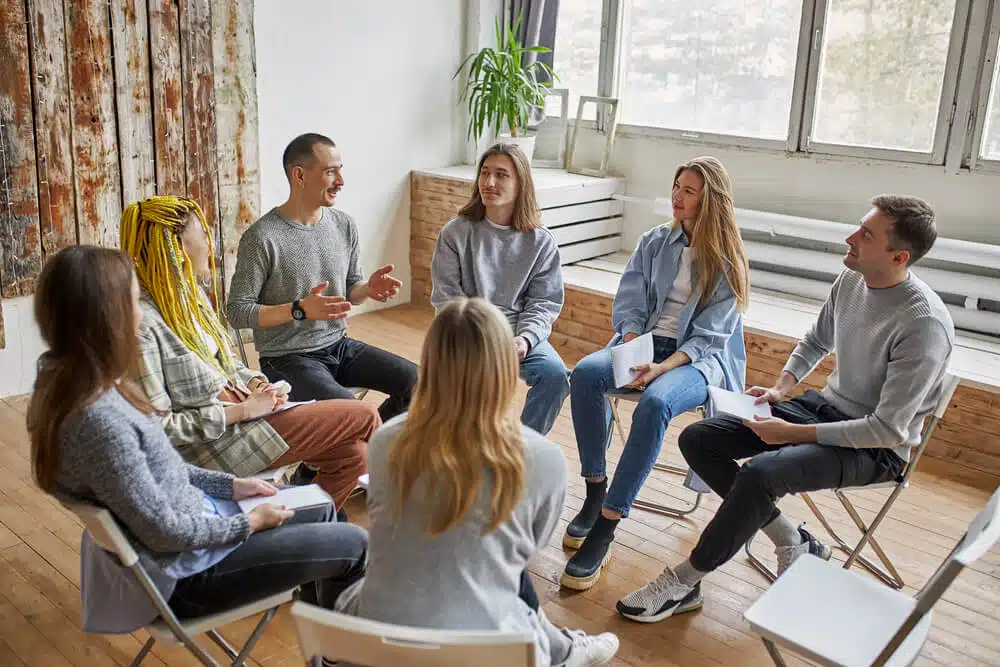
When someone you love struggles with addiction, it can feel like you’re drowning, too. The constant worry, fear, and helplessness take a huge emotional toll. Addiction ripples through entire families, which is why Helpful Links and Resources for drug rehab and aa/ na meetings and al anon must include support for loved ones. You deserve help, too.
Al-Anon Family Groups are for people affected by someone else’s drinking, while Nar-Anon Family Groups serve those impacted by drug addiction. These are not therapy sessions but gatherings of people who understand because they’ve lived it. Our Family Support Resources page connects you to these groups, where you’ll find healthier ways to cope. The meetings use a 12-Step program adapted for family members, focusing on your healing.
Alateen offers specialized support for teenagers, giving them a safe space to share with peers. You can find local meetings for all these groups on their official websites, which also offer self-assessment quizzes. The Al-Anon Online Store provides helpful literature and daily readers.
The goal of Al-Anon and Nar-Anon isn’t to get your loved one sober; it’s to help you find peace, regardless of their choices. These programs teach you to stop enabling behaviors and set healthy boundaries. You’ll learn that saying “no” can be the most loving thing to do for yourself and the person with the addiction.
Parents can find extra guidance in resources like the I Don’t Know How To: Parent Series. A key lesson is the “three C’s”: you didn’t cause it, you can’t control it, and you can’t cure it. This realization can lift an enormous burden.
By learning from shared experiences, you can find peace amid the chaos and find you’re not alone. There is hope for a better way of life for you and your family.

Take the first step towards a healthier life! Call now to connect with our compassionate team and start your recovery journey today. Your path to healing awaits!
Our recovery specialists are available 24/7 to provide support, and all calls are confidential and free. Reach out anytime – we’re here to help!
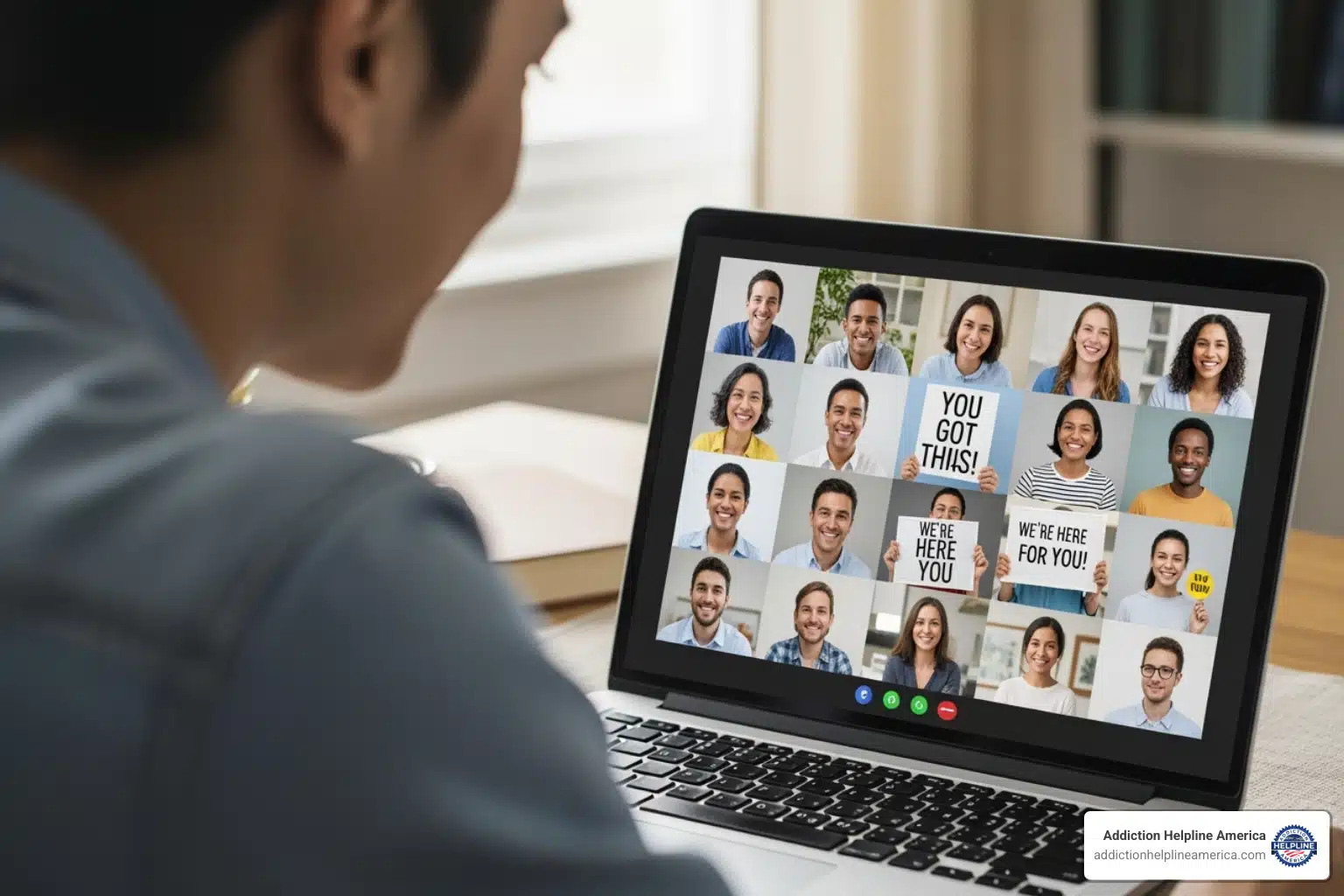
Recovery isn’t one-size-fits-all. While 12-Step programs are effective for millions, today’s landscape includes a rich variety of modern Helpful Links and Resources for drug rehab and aa/ na meetings and al anon. These science-based programs, online communities, and educational media can complement traditional support. They offer flexibility to build a recovery that fits your life. If you feel overwhelmed, our team at Addiction and Rehab Hotlines can help you steer these choices.
If the spiritual language of 12-Step programs doesn’t resonate with you, there are many evidence-based and secular alternatives. Finding the right fit is what matters most.
Our Support Groups for Addiction page details these options to help you find a community where you feel supported.
Education is a key part of recovery. Today’s media offers resources for every learning style.
These modern resources are available 24/7, providing connection, education, and hope in formats that fit into real life. They create a comprehensive support system when combined with professional treatment and peer groups.
When searching for Helpful Links and Resources for drug rehab and aa/ na meetings and al anon, many questions arise. Here are answers to the most common ones we hear.
Asking this question is a significant first step. Consider an honest self-assessment.
If you answered yes to any of these, it’s worth seeking support. The signs of addiction can be gradual, but if your use is having a negative impact and you feel unable to control it, professional help can make a difference. Reaching out is a sign of strength. Our Rehab Admissions Hotline is available for a confidential conversation about your options.
The main difference is their core philosophy.
Neither approach is “better.” The right fit is the one that resonates with you and helps you build the life you want.
Yes. Nearly all peer support meetings (AA, NA, Al-Anon, SMART Recovery, etc.) are free. They are self-supporting through voluntary member contributions, but there are no dues or fees. The only requirement for most groups is a desire to address the problem. This ensures that support is accessible to anyone who needs it.
While professional treatment like rehab has costs, which we can help you understand for options like How Much Does Rehab Cost in Alabama, peer support is always free.
You’ve just explored some of the most trusted Helpful Links and Resources for drug rehab and aa/ na meetings and al anon. From federal locators to peer groups and family resources, help is real, accessible, and waiting for you.
We know that taking the first step is the hardest part. You might feel scared, exhausted, or worried about what others will think. But taking that step, however small, changes everything. Recovery isn’t a straight line, and there’s no “wrong” way to seek help. The only thing that matters is finding the path that works for you.
At Addiction Helpline America, our mission is to provide personalized guidance that saves lives. We don’t use a cookie-cutter approach. We listen to your unique situation and connect you with the right resources from our vast network of treatment centers and support services.
Our support is free, confidential, and without judgment. We offer compassionate guidance from people who genuinely care. The hope and freedom you’re looking for are real. Millions have found it, and you can too.
Don’t wait for the “perfect” moment. That moment is now. Let us help you find the right drug and substance abuse treatment program for you. Your journey to recovery begins with a single step—and we’re here to help you take it.
Are you or a loved one struggling with addiction? Call today to speak to a treatment expert.
For anyone seeking help for addiction for themselves or a loved one calls to Addiction Helpline America are completely confidential and available 24/7.
Please note: any treatment center listed on our site that receives calls is a paid advertiser.
Calls to a specific treatment center’s listing will be connected directly to that center.
Calls to our general helpline will be answered by treatment providers, all of whom are paid advertisers.
By calling the helpline, you agree to our terms and conditions. These calls are free of charge and carry no obligation to enter treatment. Neither Sober Steps nor anyone answering your call receives a commission or fee based on your choice of treatment provider.
If you’d like to explore additional treatment options or connect with a specific rehab center, you can browse our top-rated listings, visit our homepage, or call us at (844) 561-0606. You may also contact us for further assistance.
Calls to any general helpline will be answered or returned by one of the treatment providers listed, each of which is a paid advertiser:
Our helpline is available 24 hours a day, 7 days a week at no cost to you and with no obligation for you to enter into treatment. We are committed to providing support and guidance whenever you need it.
In some cases, Addiction Helpline America charges our verified partner a modest cost per call. This fee helps us cover the costs of building and maintaining our website, ensuring that we can continue to offer this valuable service to those in need.